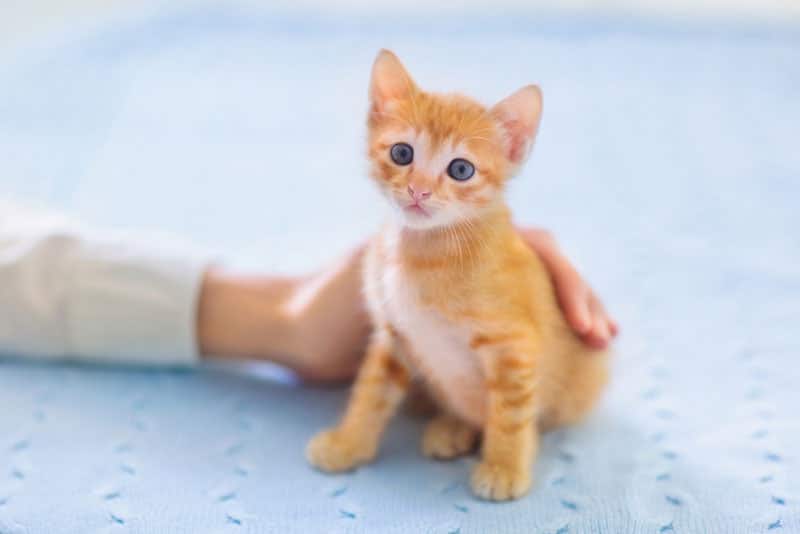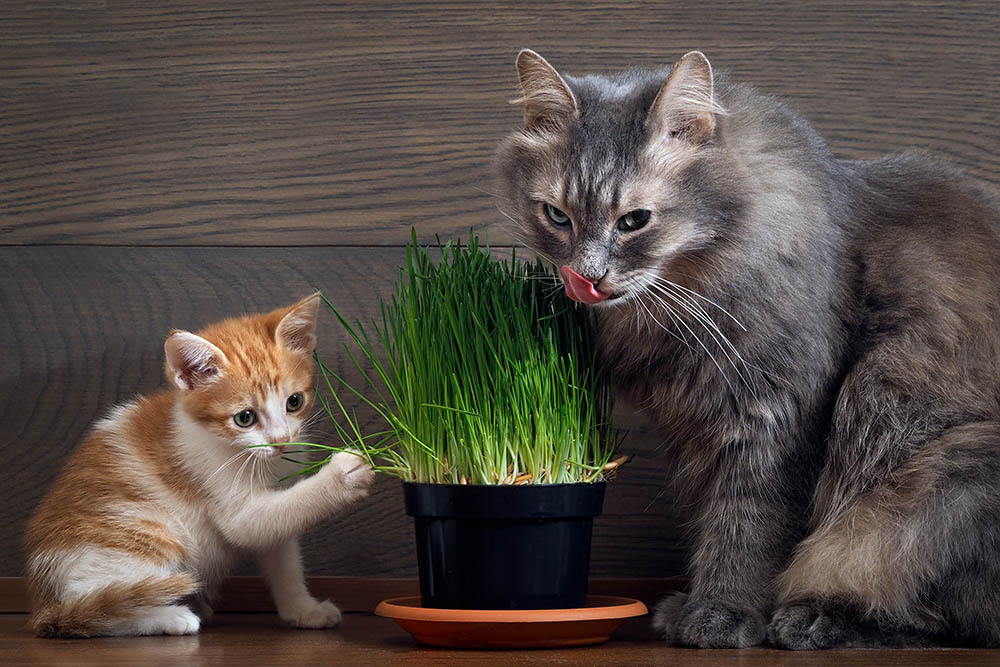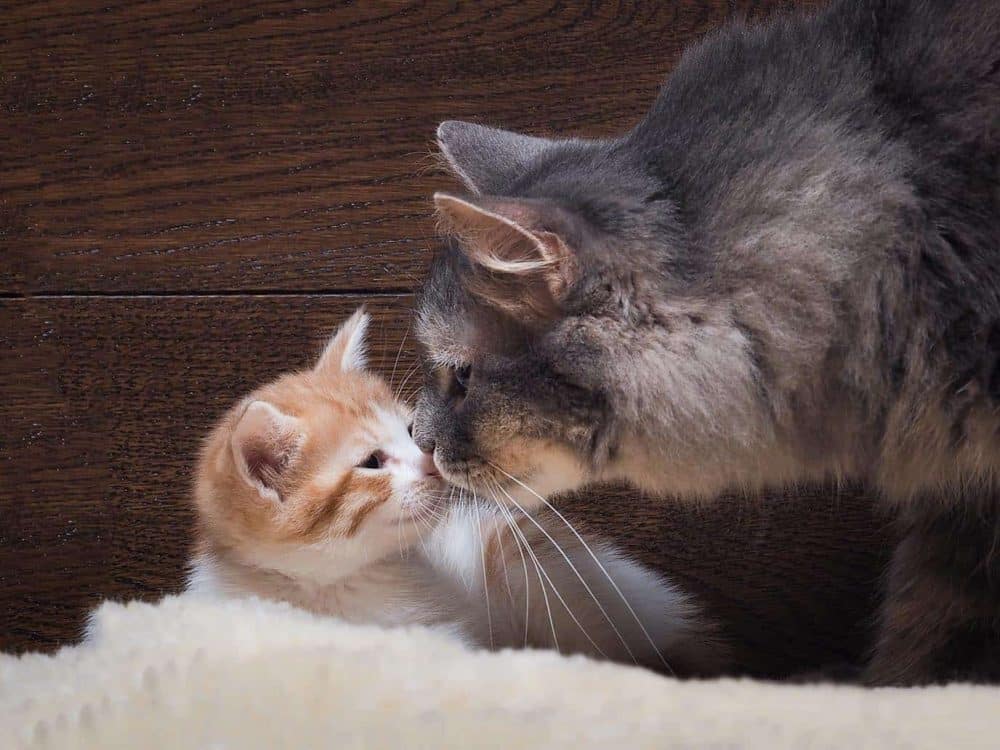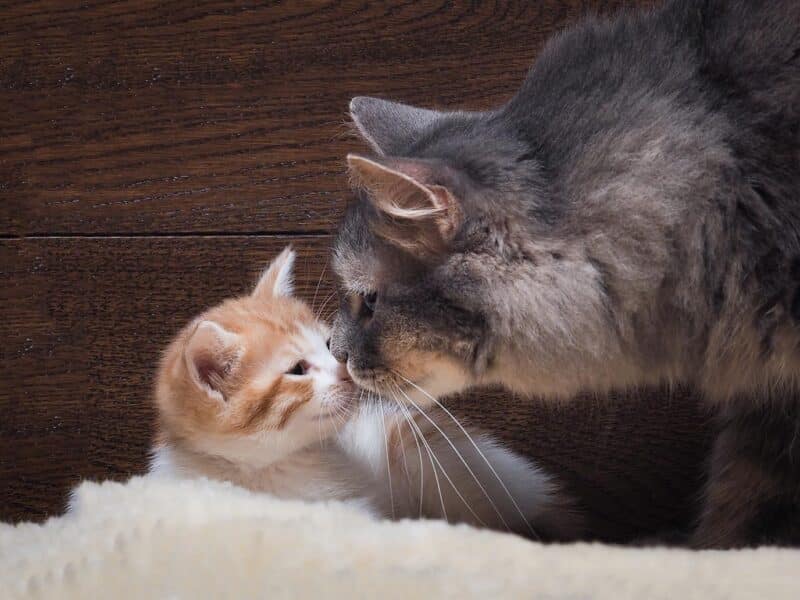Introducing pets is an equally exciting and scary prospect for devout cat owners. Will they love one another and enrich each other’s lives in your absence? Or will they jockey for power and aggressively protect their territory, making life a struggle for them and the rest of the family?
Though you can’t guarantee a positive relationship between cats, you can usually improve your chances by pairing your cat with a kitten. Find out things you should consider before getting a kitten for your cat and how to improve your chances of a successful relationship.
Should I Get Another Cat for My Cat?
Cats have evolved from a solitary species, but domestication has made them more socially flexible, and when resources are abundant, they often create cohesive colonies where individuals share in each others’ lives. Paired cats can make excellent play buddies in the home and will sleep together and groom each other. This can give them a mental and physical outlet when you’re away from home.
Compatibility isn’t a sure thing. Even if your cat had a close bond with a previous pet, you won’t know whether they will approve of the new interloper in their territory. Their age, sex, breed, and individual temperament will partially determine whether your cats will get along well.
Older cats with space to themselves for several years will usually be less willing to accept others. Though they may mellow with age, older cats can also be intolerant of a young kitten’s overly playful nature. Incongruous personalities might cause stress in one or both cats. If the cats are laid-back, they may coexist perfectly. But if they’re high-wire and domineering, there could be frequent conflict.

Should I Get a Kitten for My Cat?
Pairing a new adult who isn’t part of your established adult cat’s family group with your current pet can often cause conflicts. Your cat will likely be more tolerant of an unknown kitten, seeing them as less of a threat in their domain as they haven’t yet reached social and sexual maturity. But some cats enjoy the way things are, and if you’re mainly getting a kitten for your other cat’s benefit, remember that many cats are actually better suited to be the only cat in their home.
Of course, a kitten is also for the broader household and not only your other cat. Cats that can socialize with other pets and children from a young age typically get along better with the family and may show less aggression toward other animals. When a young cat grows up and bonds with another pet, they build valuable social skills, making it easier when you decide to get another kitten years down the line and essentially repeat the process.
How to Tell if My Cat Would Benefit From a Kitten
Considering your cat’s age, activity levels, and habits around the home and with strangers will guide you in choosing a kitten for your cat. Here are some things to consider to help you decide.
If your cat is young and energetic and always wants to play, they may enjoy having another cat to take the burden off your shoulders. As we mentioned before, the younger the cat, the more likely they are to accept a kitten. Elderly cats will be less inclined to want to play.
Are you worried your cat is bored? We can easily misread a cat’s listlessness as boredom and a need for engagement. But your cat is probably perfectly content if they aren’t destructive, stressed, or acting weird. Mistaking this as a desire for activity and adopting an energetic, curious kitten could cause more disruption than anything. If you’re around and provide enrichment, your cats will let you know they need something, and you won’t have to stress over whether you’re doing enough for them. Many cats can sleep for 12–18 hours a day, but if there is a change in your cat’s behavior or other concerning signs then you should take them to your vet for a check-up.
If your cat is unwell or recovering from a disease or injury, then it is generally not a good time to introduce a kitten. The same applies to stress-related problems.
What are your cat’s experiences with other cats? If they have had bad experiences with other cats or act fearfully or aggressively when other cats are around. Cats that adapt poorly to new situations or display distress in tense or lively situations may not want an unpredictable pet sharing the home, and you should reconsider adopting a kitten.

Choosing a Kitten for Your Cat
Choosing a kitten for your cat requires a look at their temperament and health. You should ideally be able to receive a health report on your kitten to prevent future issues or any potential threats to your current cat. Avoid cats that show hostility towards littermates or others. Although assessing temperaments at such a young age is challenging, finding a kitten with a compatible personality with your cat is ideal.
How Should I Introduce a Kitten to My Cat?
Introducing a kitten to another cat is an uncertain process. Your cats may grow accustomed to one another in only a few days, or it could take several months. Introductions should always go at your cats’ pace, and you must provide an environment that decreases the potential for conflict with plenty of resources for both cars.
Give your new cat a separate room with enrichment devices and spaces to eat, sleep, and go to the bathroom. A room that your other cat uses frequently is preferable.
You’ll start the introduction by trading scents. Swapping bedding and bringing the cats together on opposite sides of a closed door are perfect starting points. Playing with your cats on either side of the door, feeding them, and providing snacks will help create positive associations with the other’s presence.
From the initial introductions, you can build further familiarity by allowing them to explore each other’s spaces while keeping them separate. Eventually, you can work up to visual meetings through screen doors or stacked baby gates.

Tips for Improving the Relationship
The introduction process is careful and deliberate, with each step taking several days or weeks to accomplish. Constantly monitor for ambivalence or hostility from your cats. Hissing, growling, or tension at any point should cause you to slow down and potentially back up the process to prevent undue stress.
You can hopefully bring your cats together in a single space to interact under close supervision. At this stage, you can take additional steps to prevent conflict and get your cats to accept each other. Providing extra resources, including food and water bowls, litter boxes, and sleeping perches, will limit fighting.
You can add hiding spots like boxes, areas under shelves, or high surfaces to give your cats places to escape when stressed. A pheromone diffuser can also help ease tension. Create positive associations by giving your cats extra treats, toys, and playtime when the other cat is around.
Final Thoughts
Every cat is different, so there’s no definitive test to determine whether a kitten will be a good fit in the home. If you decide to get another pet, it’s best to adopt one compatible with your cat.
You’ll need a bit of intuition and awareness to make the best choice. Most importantly, temper your expectations if you do adopt a kitten. There’s always a chance that your cat won’t take well to your new pet, but by following these insights, you can give them the best opportunity for a happy relationship.
Featured Image Credit: Irina Kozorog, Shutterstock












